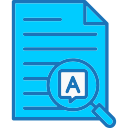Timely Custom College Paper Writing Help At Your Service
Get affordable custom research papers written starting at just $12 a page



Our term paper writing service offers several free extras to ensure flawless results.

Our experts work thoroughly on your paper until it is perfect. We also offer our clients unlimited revisions for free to make sure we produce a masterpiece.

The support team is always active and ready to attend to your issues. Whether you have a question, concern or practically anything, just talk to us and we will reply in a few minutes

Our writers are punctual. Once we receive your paper we start working on it immediately. We always deliver the essay before the deadline even if it was in a short notice.

With our Essay Writing Service, there is no room for plagiarism. We promise to deliver unique content that is free of plagiarism.
Writing custom term papers is a process that requires apt skill and experience. For most courses, the term paper is the climax of the syllabus. Most students spend their entire semester just trying to make their essays sensible.
Few students write the paper correctly because it’s difficult to balance studies, class assignments and other school activities. But, we have the perfect way to score the top grade in your custom research term paper! Gudwriter essay writing help is all about fetching you good school grades. We will handle your custom college papers meticulously following all your instructions
Nowadays, there are lots of custom term paper writing sites. What you should know is that creating customized college papers is not an easy task which is why students look for help. These papers require sufficient knowledge in a specific subject for you to attain good grades. However, you will find that students do not have enough time or knowledge to remarkably create high quality essay papers.
That is why we offer cheap custom research papers to students. Our services are quite cheap as we are aware students do not operate on high budgets. We are fully aware that a student’s life is not all about studies, but there is job, family and social life. That is why we encourage you to buy custom term papers from us and attend to other crucial matters in life. We aim at offering you the best quality paper writing service and make your school life easy.
We follow a strict set of guidelines to ensure our standards remain as high as we set them. The papers you order from us has to go through a series of editorial gateways to get you top-notch writing services. Below is how we write your custom term paper:
Today, there are lots of custom term paper writing services. All these sites claim to help students with custom writing services. However, most of these will provide plagiarized content and low-quality papers to their customers. You should be careful who you hire your services from. Most of these sites are fraudulent. They were created for the purposes of making money and not providing writing help to students.
However, our essay writing service values our customers. We want to ensure you receive value for your money. We hook you up with the best writers to handle your research papers. Whether you have a tight budget or require your academic paper in the next few hours, we will help you out.
We also have the best plagiarism checker to ensure we present to you plagiarism-free papers. Before sending the paper, we have to make sure it is 100% original and unique.
You might have already noticed how easy it is to use our platform and order a term paper. Our site is straightforward, intuitive, and easy to navigate through to get what you are looking for.
And, once you place your order, you will get a reply in a few seconds. Our customers love us because we provide them with the highest quality term papers.
We also understand you’re working under tight deadlines and that’s why we want to give you quick results. But, we understand that you want high-quality work too! So, we have principles upon which we base our services including;
Yes, of course. We will help you out with the term paper. If you do not have enough time to finish up your writing assignment or you are finding it hard to complete it, you can always trust our services. We have the best writers in the industry who will not only get you good grades but also boost your knowledge.
Our experienced support team is always working hard to better our services and make our customers happy. We give you the opportunity to manage your time better, do other things that matter as you receive quality grades. Fell free to talk to us and ask us any question about our homework help online services.
Every day, we receive emails from college students who’re overwhelmed by their studies and schedules. Some students have to juggle up between education, co-curricular activities and work. Working while studying can be cumbersome, we step in top to make their lives a little or bearable.
We have a diligent team of professional writers who will work on your custom term paper and give you a piece that will earn you a Grade-A, effortlessly! So, never worry about hitting your deadlines or scoring good grades because we’ll handle that for you. Meanwhile, you can let us deal with the quality and grades while you work on more pressing issues.
Order your term paper today, sit back and let our experts handle it!
Our selection of online writing tools is here to assist you in overcoming the obstacles you may encounter while crafting your ideal paper.
We offer a range of essential tools designed to enhance your writing experience. Explore our range of tools, including:

Don’t worry about the quality of your paper. Buy Custom Term Papers from us and get rid of your writing troubles.
Term papers are research papers with specific instructions and must be handed in to your professor at the end of the semester.
It might take you a long time to finish your college term paper. But, for us, 24 – 60 hours will do. Within this time, we’ll research, format, write and edit your research answers. Our writers and editorial team runs the piece through several fact-checking and quality gateways before it reaches you.
Affordable! We offer some of the cheapest essay services in the market today! Our cheap custom research papers’ prices go for as low as $12 per page! Many students even believe we go at a loss especially when we give so much quality for so low. But, we are more committed to helping you pass your exams and have a smooth school life than mint from your situation.
If you were to require a revision from a paper we’ve done, it’d mean an error by our writer. So, we’d have to revise that paper free of charge. In fact, we offer free unlimited revisions until you are satisfied with the paper. The only time we’d negotiate a payment is if you require new information not included in the initial set of instructions. Any other time, you get the revision done for free!
Yes, we have a large group of specialized writers for every topic or discipline that you would like us to handle. Our custom coursework tutors are skillful and experienced enough to make your coursework a walk in the park!
Yes, getting writing help online for your papers is 100% legal. The online companies are registered in accordance with the existing laws to tutor you and make your academic work easier on the internet. We are a legitimate business that guides you to academic success. We provide learning aids to you to improve your custom research papers writing skills and overall academic performance.
A 10-page custom term paper will cost somewhere between $120 and $260 depending on your deadlines and instructions.


Get your troublesome papers finished by our professional writers now!
Our service is simple, concise and efficient.
Upon getting to our website, what you do is tap on the Order Now icon and then fill out a form provided. If you have a discount code ensure you use it before checking out the page.
At Gudwriter we have several payment options for our clients. You can decide to pay via PayPal, MasterCard, Visa, Discover or AmEx. We have the most secure system so you do not have to worry about your security. After the payment, the order processing commences. Communicate with your writer and send them any additional documents for the order to be duly completed
After the writer has completed your paper, you will approve and download it. Go through your paper and if you have some tweaks you need attended to, you can send the paper for free revisions until it satisfies you.
To get started, simply click the order now button and provide all the details!